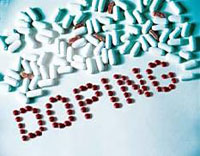"Biological passport" to root out doping frauds
A "biological passport" will be required from cyclists before competitions as an attempt to eradicate doping cheats. Cycling managers and cyclists voiced different opinions at a glitzy Paris presentation of the 2008 Tour de France: some see it as a new era for cycling, others as a potential legal minefield.

"It's a good starting point: To look each other in the eyes, and say, 'This is what we have to do,"' said Johan Bruyneel, who coached Lance Armstrong to a record seven consecutive Tour wins and Spain's Alberto Contador to this year's title.
"It is, in my opinion, the best available measure in the sport," Bruyneel said. "It's stricter than anything else, but it's what we have to do ... to regain the credibility of the sport."
Thomas Voeckler, the 2005 French national champion who rides for Bouygues Telecom, said riders who don't have anything to hide can only applaud the measure, but fears cheaters will try to argue their way out of sanctions.
"We all know that riders (who test positive) are litigious, hiring high-powered lawyers," Voeckler said. "They better not win (their cases) afterwards. There's no point to set it up if it's not a constraint on the riders, or ends up in cases being thrown out."
With the last two Tours tarnished by cheating, Tour organizers insist they will have the final say about which teams can take part in 2008 even though ProTour teams traditionally get automatic entry.
Organizers said Michael Rasmussen, who led this year's race until being sent home for missing pre-race doping tests, won't be welcome. Even Contador, who recently joined the doping-tainted Astana team after his former squad Discovery Channel was disbanded, isn't guaranteed an invitation.
The "biological passport," announced by the International Cycling Union last week and set in motion Tuesday, is the latest effort to stem the doping tide. Advocates call it unprecedented and say it could set an example for other sports.
The program, which is scheduled for a January start, will involve drawing up riders' medical profiles or "passports" with tests over time monitoring up to six blood parameters.
If an anti-doping test turns up anomalies compared to the profile, a cyclist could be barred for starting a race or face sanctions though possible penalties are still being worked out.
"Whether I agree with it or not, I'll have to do it so it doesn't change much," said Cadel Evans, an Australian who placed second in this year's Tour.
The UCI is also hoping to increase anti-doping tests by more than 50 percent next year to 15,000, with more than half conducted out of competition up from about a quarter in 2007.
Tour organizers, who have long been in a power struggle with the UCI, say they're doubly encouraged that the World Anti-Doping Agency will oversee the passports along with the cycling union.
"Anything that can lead to catching cheats is good," said French two-time former Tour champion Laurent Fignon. "The passport is good because riders will be monitored over their careers."
"But there will always be cheaters," he said.
Subscribe to Pravda.Ru Telegram channel, Facebook, RSS!


